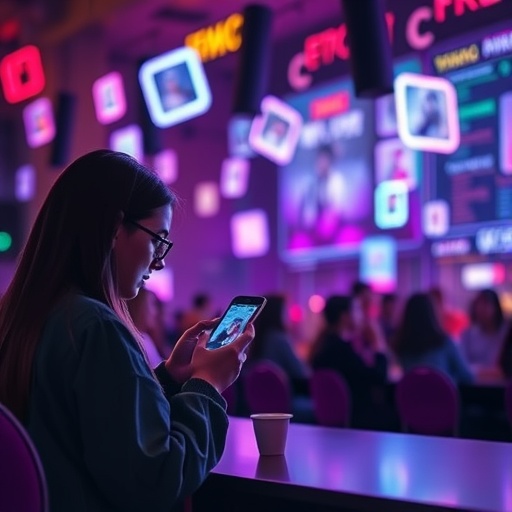In an era dominated by digital connectivity and ubiquitous smartphone usage, a new study sheds light on the significant impact of social media engagement on mental health and overall life satisfaction, particularly among medical students. Published in the journal “Discover Mental Health,” the research conducted by Younis, Mohammad, and Elsebaey at Tanta University in Egypt uncovers intriguing links between smartphone addiction, the fear of missing out (FOMO), and life satisfaction levels.
Mobile devices have revolutionized communication, fostering continuous connectivity that significantly influences our day-to-day interactions. Medical students, often facing high-stress environments and demanding schedules, may find themselves increasingly reliant on their devices to stay connected. This dependence, however, has its downsides, raising crucial questions about the balance of connectivity and mental well-being.
The researchers carried out a comprehensive analysis, utilizing anonymous surveys administered to a dynamically selected cohort of medical students. These students were asked about their smartphone usage habits, levels of involvement with social networks, experiences of FOMO, and overall satisfaction with life. The study aimed to draw correlations between these variables, offering insights into how modern connectivity might detract from, or enhance, a student’s overall quality of life.
Preliminary findings indicate that a substantial portion of the surveyed students reported high levels of FOMO. The phenomena—characterized by anxiety and unease stemming from the perception of missing out on rewarding experiences—has been portrayed as a byproduct of hyper-connectivity. This anxiety is amplified in the context of social media, where curated portrayals of others’ lives can lead to negative self-comparisons among users, particularly in the high-pressure environment of medical education.
Moreover, the study emphasizes the prevalence of smartphone addiction among the participants. Many students acknowledged spending excessive amounts of time on their devices, often to the detriment of their academic responsibilities and personal relationships. The constant barrage of notifications and the endless scrolling through social media feeds can create a vicious cycle of distraction and procrastination, further exacerbating the pressures faced by medical students.
The authors of the study highlight the health implications of such addiction. As students become increasingly engrossed in their digital lives, essential activities, such as studying, sleeping, or even engaging in face-to-face interactions, tend to suffer. The withdrawal symptoms associated with decreased usage of these platforms can result in heightened anxiety, leaving students in a perpetual state of dissatisfaction and unrest.
Life satisfaction emerged as a crucial element intertwined with smartphone use and FOMO in the study. While some participants expressed feelings of fulfillment derived from social media connections, many reported that these interactions often lacked depth and genuine connection. Consequently, even with vast networks of virtual friends, students felt lonely and disconnected, leading to a paradox where increased social media use correlates with decreased satisfaction in real life.
Understanding the intricate relationship between these factors presents a pivotal opportunity for educational institutions and mental health professionals. By acknowledging the compulsive behaviors linked to social media and providing resources to counteract these effects, universities can foster healthier environments for their students. Implementing educational programs that teach time management, digital literacy, and mental well-being can empower students to harness technology positively.
The research poses significant implications for future studies focused on mental health among young adults. As technology continues to evolve and smartphones become even more integral to daily life, examining the nuances of how these devices impact psychological wellness should be of paramount importance. This study underscores the necessity for continuous evaluation of social media’s role in shaping life experiences for students, particularly those in high-stress academic fields.
Ultimately, the findings from Tanta University provide an important insight into the dual-edged sword of smartphone technology. While it possesses the potential to connect and engage users, it also harbors dangers that can exacerbate feelings of isolation and stress. For medical students, this balance becomes even more critical, considering their demanding studies and the high stakes of their future careers.
Adjusting behaviors surrounding smartphone usage and social media could be key in promoting healthier lifestyles among students. By prioritizing real-life connections and experiences over virtual interactions, individuals may discover a pathway to increased life satisfaction. The researchers advocate for mindfulness practices as a tool for students to manage their social media engagement actively.
As mental health continues to emerge as a crucial component of educational success, addressing the implications of smartphone addiction and social media FOMO will be essential in maintaining a generation of healthy, engaged, and satisfied professionals. A collective effort involving students, educators, and mental health advocates will be central to fostering resilience in an increasingly digital world.
In conclusion, the research by Younis, Mohammad, and Elsebaey has spotlighted a critical intersection of technology and mental health. The study serves as a wake-up call for individuals and institutions alike to critically assess the digital habits that shape their lives. Fostering awareness and promoting healthier behavior can lead to significant improvements in life satisfaction among students, paving the way for a more resilient future.
As the digital landscape continues to evolve, understanding its effects on youth mental health will remain an essential area for further exploration. Researchers, educators, and policymakers must remain vigilant, ensuring that advancements in technology serve to enhance, not hinder, the well-being of the next generation.
Subject of Research: The impact of smartphone use and social media on mental health and life satisfaction among medical students.
Article Title: Toward healthy behavior: fear of missing out, smartphone, social networking addiction, and life satisfaction among medical students at Tanta University, Egypt.
Article References:
Younis, E.A., Mohammad, A.M.A. & Elsebaey, A.F.A. Toward healthy behavior: fear of missing out, smartphone, social networking addiction, and life satisfaction among medical students at Tanta University, Egypt.
Discov Ment Health 5, 106 (2025). https://doi.org/10.1007/s44192-025-00227-0
Image Credits: AI Generated
DOI:
Keywords: smartphone addiction, fear of missing out, social media, life satisfaction, mental health, medical students, Tanta University.




